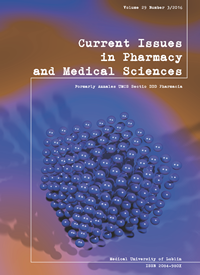The evaluation of 25(OH)D concentration in blood serum of chronic heart failure patients
DOI:
https://doi.org/10.1515/cipms-2016-0021Keywords:
calcium, inorganic phosphates, chronic heart failure, Vitamin DAbstract
This current study examined patients with severe chronic heart failure (CHF) in order to ascertain the held vitamin D, based on an assessment of calcidiol [25(OH)D] concentration. It also identified and evaluated possible correlations between 25(OH)D level and the concentration of total calcium, inorganic phosphates and creatinine concentration in their serum. Herein, venous blood samples were taken from 36 patients with CHF. Diagnosis was confirmed by echocardiographic, as well as by electrocardiographic examinations. In this work, the control group consisted of 41 randomly selected healthy individuals. The results of our study showed that CHF patients had significantly lower concentration of 25(OH)D, as well as total calcium and inorganic phosphates. Moreover, mean creatinine concentration was higher, in comparison to the control group, but did not exhibit statistical significance. As calcium-phosphate homeostasis is regulated by numerous factors, including PTH, neurohormonal factors and calcitriol (1,25(OH)2D), it is possible that vitamin D deficiency may play a significant role in the pathomechanism of CHF, and a lowered 25(OH)D level may be related to progression of the disease.References
1. Bednarski R., Donderski R., Manitius J.: Rola witaminy D3 w patogenezie nadciśnienia tętniczego. Pol. Merk. Lek., 23, 307, 2007.
2. Cubbon R.M. et al.: Calcium, phosphate and calcium phosphate product are markers of outcome in patients with chronic heart failure. J. Nephrol., 28, 209, 2015.
3. Czech-Kowalska J. et al.: High prevalence of neonatal vitamin D deficiency- rationale for reevaluation of vitamin D supplementation during pregnancy. Arch. Perinat. Med., 14, 18, 2008.
4. Czech-Kowalska J. et al.: Profilaktyka niedoborów witaminy D. Endokrynol. Diabetol., 19, 57, 2011.
5. Gotsman I. et al.: Vitamin D deficiency is a predictor of reduced survival in patients with heart failure; vitamin D supplementation improves outcome. Eur. J. Heart. Fail., 14, 357, 2014.
6. Karczmarewicz E. et al.: Deficyt witaminy D jako czynnik ryzyka nadciśnienia tętniczego i chorób sercowo-naczyniowych. Stand. Med. Pediatr., 6, 736, 2009.
7. Marcinowska-Suchowierska E., Kozłowska-Wojciechowska M., Filipiak K.: Suplementacja witaminy D u ludzi dorosłych. Terapia, 247, 3, 2010.
8. Milovanovic M. et al.: Vitamin D Deficiency is Associated with Increased IL-17 and Tnf-α Levels in Patients with Chronic Heart Failure. Arq. Bras. Cardiol., 98, 259, 2012.
9. Niemirska A., Litwin M.: Witamina d a ryzyko sercowo-naczyniowe i nadciśnienie tętnicze. Stand. Med. Pediatr., 9, 659, 2012.
10. Walicka M. et al.: Niedobór witaminy D– problem społeczny. Post. Nauk Med., 21, 14, 2008
11. Wang T.J. et al.: Vitamin D Deficiency and Risk of Cardiovascular Disease Circulation, 117, 503, 2008.
12. Witham M. D.: Vitamin D in Chronic Heart Failure. Curr. Heart. Fail., 8, 123, 2011.
13. Zittermann A. et al.: Low vitamin D status: A contributing Factor in the Pathogenesis of Congestive Heart Failure? J. Am. Coll. Cardiol., 41, 105, 2003.
Downloads
Published
Issue
Section
License
Copyright (c) 2016 Authors

This work is licensed under a Creative Commons Attribution-NonCommercial-NoDerivatives 3.0 Unported License.


